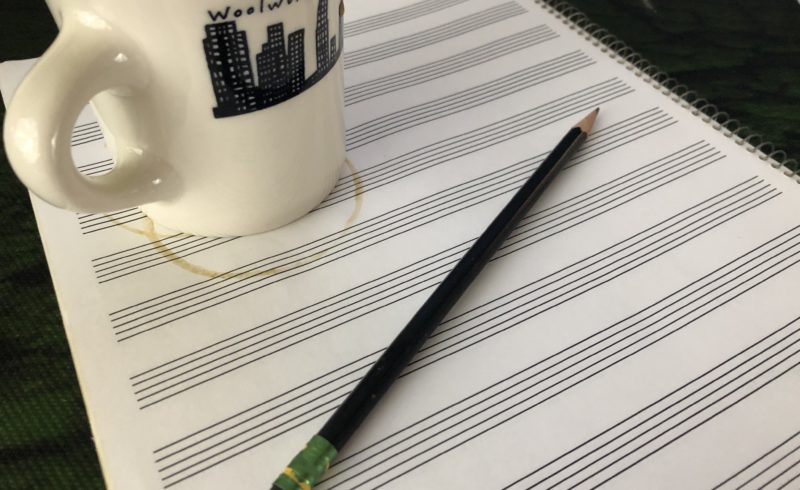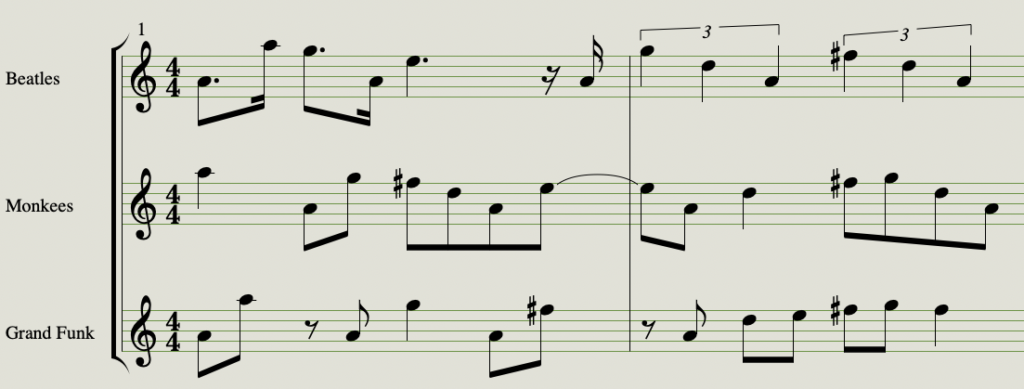
The new Chevrolet Silverado commercial sounds just like The Monkees “Pleasant Valley Sunday!” How can that be legal??
If you get two inquiries like that, there must be a lot of people wondering, “How is Chevy getting away with copying “Pleasant Valley Sunday” and using it to sell a truck?” Isn’t this infringement?
Well, no.
But when I thought about how the question arises, and imagined Mickey Dolenz on the phone asking for a musicologists report, I thought, “this might at least be interesting.” So I’m posting this partly for my amusement.
And because I can put Homer Simpson in it.
First, here’s the commercial for the 2024 Chevy Silverado:
Yes indeed that opening guitar figure could easily be mistaken for Michael Nesmith’s very familiar intro to “Pleasant Valley Sunday.” But it’s not.
It’s Grand Funk Railroad! You know Grand Funk right? They’ll come to your town to help you party it down.
Homer might also confuse them with Mountain, who did Mississippi Queen. I don’t know why they didn’t play “We’re An American Band” instead, but anyway…
After “We’re an American Band,” I think Grand Funk’s next most long-lived hit was probably the one you just heard in the Chevy commercial, “I’m Your Captain,” still a classic rock staple.
And its guitar intro is easily mistaken for one of the Monkees biggest hits, Pleasant Valley Sunday.
The Monkees, while not really a band, had a cool logo and fantastic songs written by the likes of Tommy Boyce, Bobby Hart, Carole King, David Gates, and Neil Diamond. “Pleasant Valley Sunday” is Carole King and her frequent collaborator and husband Gerry Goffin. And like everything else she ever touched, it’s worth checking out. Gotta love YouTube for things like this:
But where’s the guitar intro?
That wasn’t King. It was added by Monkees’ producer, Chip Douglas (bassist for the Turtles when they did “Happy Together”) who said he was inspired by the guitar intro on the Beatles’ “I Want to Tell You” off the Revolver album, which makes perfect sense, and warms my heart.
That opening riff probably doesn’t strike you as nearly so similar as I’m Your Captain and Pleasant Valley Sunday, and it’s not, but I’ll explain the connection right after this quick rant:
If there’s one thing you can’t get away with anymore, it’s naming the inspirations for your song. Someone will call that a smoking gun. Someone else will believe them. And it’s usually stupid. Quote me.
Brian McBrearty — Musicologize
These are all the same sort of guitar riff, played on two or three strings where the lowest and most persistent note is played on an open string. Both songs are in the key of A and that open string grounding the riff is the second string on a guitar, an A.
I’m reminded of an extreme example and one of my favorite guitar riffs ever:
“Breakdown” relies on a drop tuning that lowers the first (lowest) guitar string, but this riff, like the Beatles and Monkees songs, are all grounded by the open second string, A, and that’s the key they’re all in.
(By the way, AC/DC’s “Thunderstruck,” before anyone shouts that at me, is relatable but quite a bit different.)
Nothing matters as much as the notes, but this “guitaristic” stuff matters too if I’m providing testimony or analysis around copying. Set against that repeating open A string, “Breakdown” is playing higher notes in scale order A B C B A. In contrast, the Beatles, Grand Funk and the Monkees are playing notes in scale order downward, more or less A G F# E D, against their low A. The guitar sound and the specific technique add a lot to the perception of similarity, but they’re specifically different as you’ll see in a minute. There are compositional figures in music — “Stairway To Heaven” comes to mind also — which are attributable in part to the mechanics of the instrument they were composed on. The availability of certain options on the instrument influence the note choices. It’s certainly possible to be a great composer without being a virtuoso, but as in writing, facility and vocabulary will help you tell stories. When some of the subtleties of an element shared by two works are attributable to what I might call “guitar-isms,” it becomes a musicological factor.
As for the notes, “Pleasant Valley Sunday” and “I Want To Tell You,” are similar, but not very. And as for Grand Funk…
They have to have known “Pleasant Valley Sunday,” a pretty big hit released as a single in 1967. Obviously “I Want To Tell You” is not a big Beatles song, but it’s The Beatles, and Revolver is the best Beatles album.
(Oh, yes it is.)
“I’m Your Captain” is not as much the same as you think. Usually, key matters very little to me, but “I’m Your Captain” is in the key of D, not A like the others. Grand Funk is taking advantage of the guitar in a similar way, but they’re doing it all on the next guitar string higher. (Probably because the body of the song is reliant upon the king of guitar-isms, the Dsus4 chord. No time for that now. Musicologize readers probably know what I mean anyway.)
And the notes… here they are… I transposed “I’m Your Captain” into the key of A for ease of comparison.

Again, what we’re all hearing as similarity is that the Monkees riff and the Grand Funk riff both have those high notes going down the mixolydian scale A G F# against that recurring low A. The Beatles is a little different; it goes A G E. But the rhythmic placements of these important melody notes are different across all three. And before anyone says anything, I know The Monkees riff isn’t exactly the same for the whole intro, and Grand Funk’s is actually a four-measure phrase, but this illustration keeps things simple and is perfectly indicative of the key differences.
Then there’s the matter of whether the Monkees could even claim to own these little add-ons to a song that Carole King presumably still owns the rights to. The guitar intro does not a derivative work make, I’d say, and I wouldn’t expect King to have granted those rights anyway. (The right to create derivative works is part of copyright.)
Another view point is that, yes, these are all original works, but this intro isn’t a huge part of any of them. And they’re pretty simple. When figures are simple and brief they’re usually subject to what is known as “thin copyright,” and in cases of “thin copyright” the similarity threshold is approximately “identical,” which these are not.
Then, since these songs are all pre-1972 there’d be the question as to whether the guitar intros appear on the deposit copy transcriptions registered with the copyright office. I’d be shocked if they were, and if you’re at all wondering what I’m talking about, check out last weeks post about Ed Sheeran and the Let’s Get It On case that I can’t believe is still a thing in 2024.
So for all kinds of reasons, the answer is no. No, Chevy did not steal “Pleasant Valley Sunday.” The end.